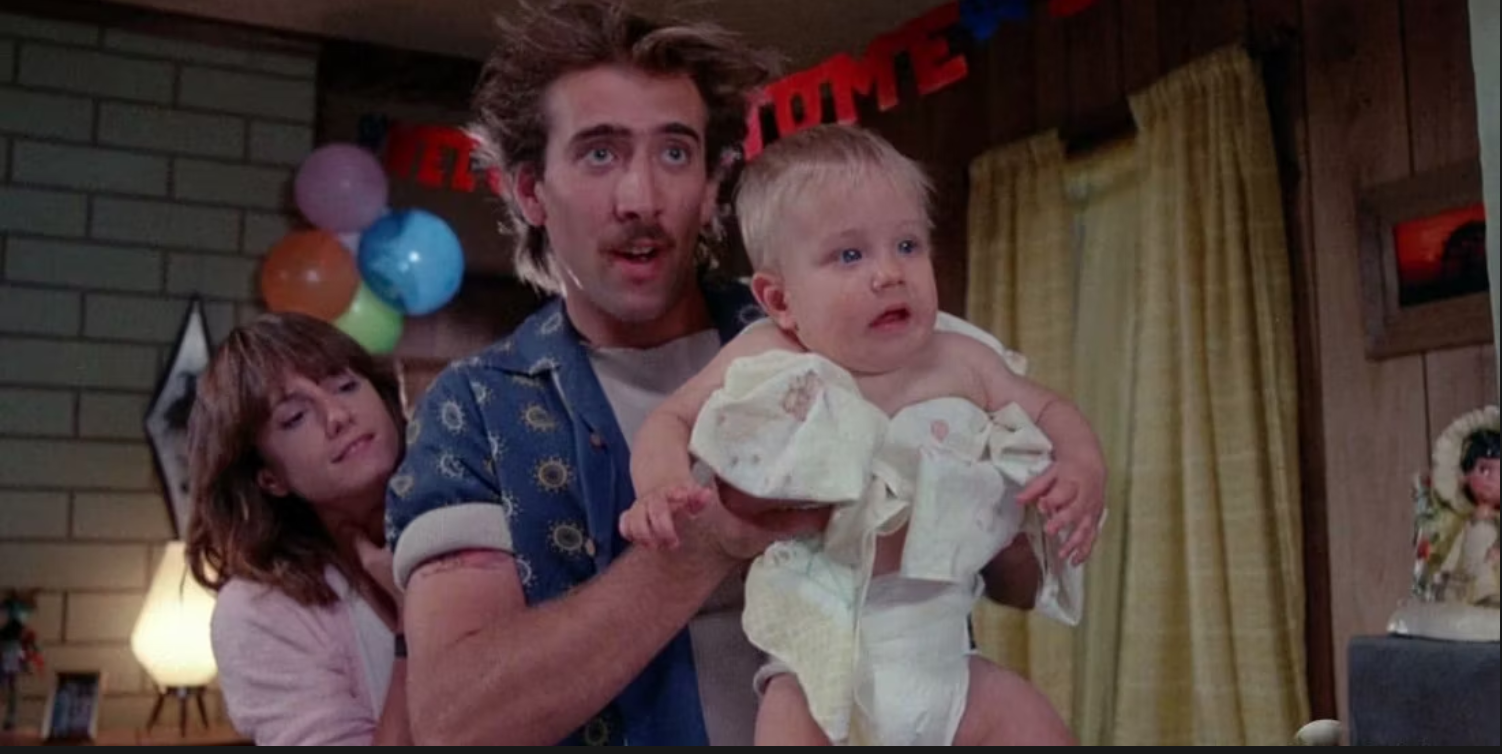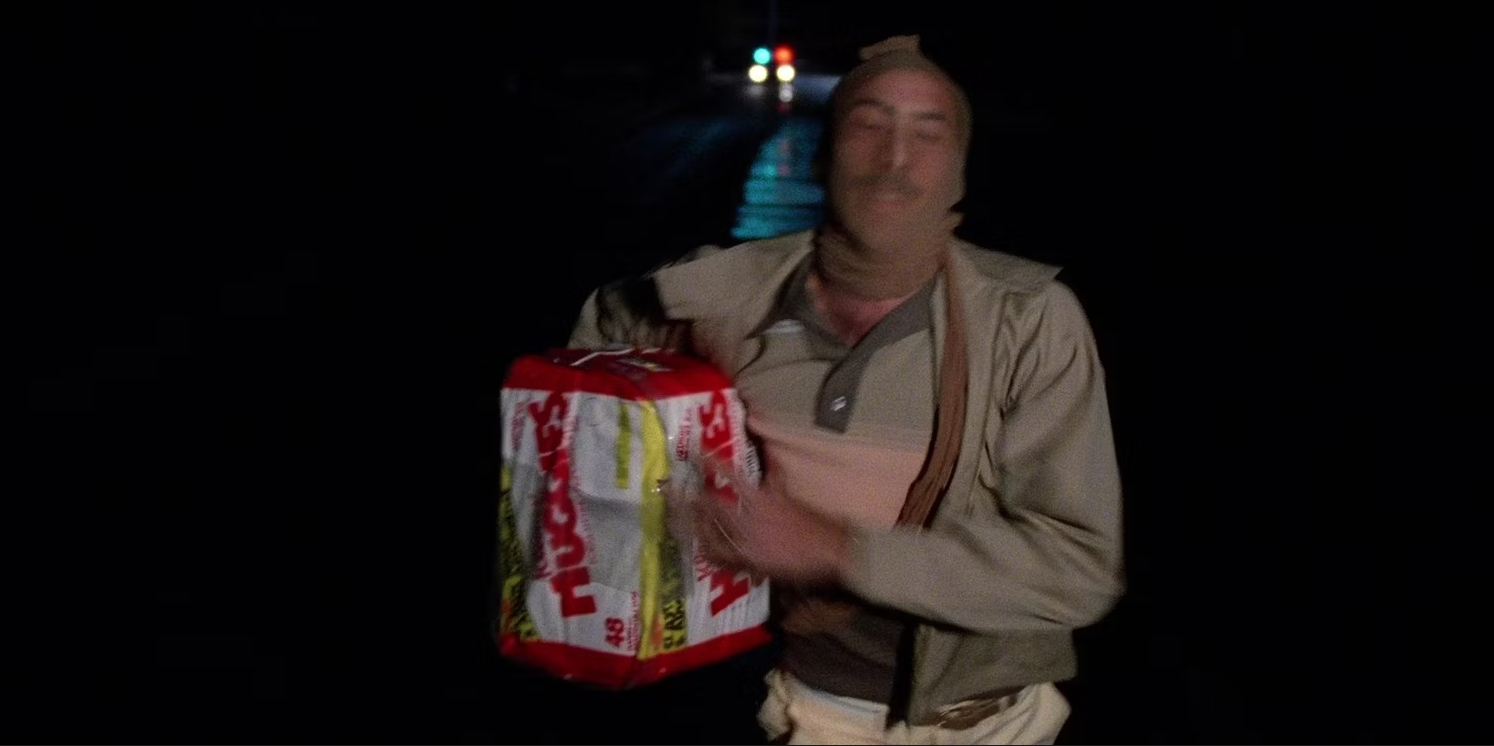A Life in Film is a project where I’m writing about a movie from every year I’ve been alive.
1987: I’ll be taking these Huggies and whatever cash you got.
RAISING ARIZONA (dir. Joel Coen, officially, but come on)
I never want to lean too hard on the autobio side of this project, but in this case it’s really hard not to, at least a little. More than any other movie I’ve talked about, and on a couple of different axes, Raising Arizona was a movie that served as a gateway to other places and ideas. If you weren’t around in the 1980s, I don’t know that you can really appreciate what it was like to encounter Raising Arizona for the first time. I’ve probably said this sort of thing before, but it’s like 50 times as true for Arizona than it is for anything else.
There’s this body of discourse that floats around Bluesky pretty frequently about how the 80s weren’t the cool neon vaporwave retrofuturescape that gets held up with some frequency as a stand-in for the era, that it was actually a whole lot more beige than people try to pretend it was; and, as usually with a discussion like that, I sort of simultaneously agree and think it’s more complicated than that. But I think there’s a parallel argument to be had about 80s culture; we remember the good and the notably bad, but that memory of extremes really obscures the fact that most of what we watched, listened to, and read in the 80s was pretty boring, mid, and, well, culturally beige.

And I can promise you that in the cultural landscape of the Reagan era, damn few people were making unhinged live-action Looney Tunes cartoons that piled off-kilter dialogue, surreal action, and a lot of banjo-and-yodelling songs around a resonant emotional core. “What on Earth is this?” was the vibe the first time I saw Arizona. “I don’t entirely know what the hell’s going on, and I didn’t know you could do stuff like this in a movie, but I am into it.”
I would’ve been in 8th grade, I think, by the time Arizona made it to HBO and I watched it with my parents (who, credit where credit is due, were pretty adventurous when it came to watching weird shit on HBO) and got knocked off-kilter by it. As an 8th-grader in rural Nebraska, I wasn’t exactly hep to the Coens and Blood Simple, but even if I somehow had been, I still would’ve been knocked off-kilter. With hindsight, it’s amazing what a swerve Arizona was for the Coens, especially after all of the (entirely justified) praise heaped on Blood Simple. From masterful Western neo-noir to surreal comedy is a hell of a shift, one that mostly sets out the boundaries of the space they’d be working in for the next several decades.* And as much as I love a lot of their later comedies, I don’t know that they ever made another that harnesses the same chaos energy that drives Arizona. Lebowski’s hilarious, but in a way that’s significantly less deranged than Arizona.
*I guess it also laid out one of the major avenues of debate on the Coens, “which is better? The noirs or the comedies?” I’ve seen people argue eloquently and persuasively on both sides. My answer: whichever bucket you think Fargo fits into.
But so yeah. It wasn’t apparent at the time, but as a poor, weird little nerd in an out-of-the-way town in Nebraska, a Coens comedy was a big neon arrow pointing towards another world: Intellectual, maybe neurotic. Offbeat, borderline Dadaist. Self-assured in its weirdness. Humane, underneath the calculated sheen. Weirdly suffused with reverence for olde-tymey banjo music. And, somehow, Minneapolitan, or at least Twin Cities Metropolitan.** In a beige era, a gateway like this was pretty invaluable. It’s not like I saw this movie and immediately said to myself “I’m going to move to Minneapolis some day and be a fancy guy who writes things;” but it was somewhere around here that I started slowly boulder-rolling in that direction.
**One of the big self-reflective mysteries of my life is whether there’s any significance to the fact that as I started growing into young adulthood, I fell in love more or less simultaneously with so many cultural outputs of Minneapolis, not really cognizant at the time that any of them had anything to do with each other. All I know that the desk I’m sitting at is an easy walk from Paul Westerberg’s childhood home, and a short bike ride away from the neighborhood where the Coens grew up. I often park next to what used to be Hüsker Dü’s business office when I’m picking up Thai food.
But enough about me; let’s talk about the movie. Like I said, it’s unhinged, but in a joyous way. This is a comedy that masters its tone so well that it makes you willingly root for baby-kidnappers, and manages to sell a guy getting blown up by a hand grenade as a funny outcome. And how about Cage’s look of earnest apology when he realizes he’s pulled the pin on said grenade? I’m trying to cut down on pronouncements that every movie I write about contains the best work of [actor]’s career, but Raising Arizona certainly set my mental model for What Nicolas Cage Is Like. And while I’m at it on the cast: this was the first thing that clued me into the massive awesomeness of John Goodman.
Two little items stand out to me on the writing: First, I love that the Coens chose to make Nathan Arizona a fundamentally good guy. This, I guess, is what cements the thing I mentioned earlier about the movie’s essentially humane nature. Even the stuffed-shirt rich guy, who easily could be set up as the villain, loves his wife and just wants what’s best for everyone (I guess this is paralleled by the fact that everyone who encounters the baby falls in love with it so much that they want to keep it; and H.I. and Ed’s character growth comes from them coming to realize that they can’t just take what they want).

And then: I submit that the moment when the guy in the truck laconically says to H.I., “Son, you got a panty on your head” is maybe the most sublimely-written moment of dialogue to happen in the entire 1980s.
Raising Arizona isn’t a perfect movie; but it’s such a unique beast that it’s tough to find points of comparison against it. About the only thing I’ll say against it is that, with all the yelling and yodeling, Raising Arizona is absolutely not the movie to watch if you’re a teen hanging out with your friends at their house and their parents have tolerantly said sure, you can stay up and watch a movie, just as long as it’s quiet.
Great piece about a great film.
Probably in my Top 3 comedies and in heavy rotation throughout my undergraduate years. You notice new nuance each time you watch it and it’s endlessly quotable, particularly lines delivered by the recently-deceased M. Emmet Walsh, billed simply as “Machine Shop Ear-Bender.”
“Machine Shop Ear-Bender” is a *fantastic* credit to pick up, and I think it says a lot about him and the Coens that he was a part of so many of their earliest movies.
And: thanks!